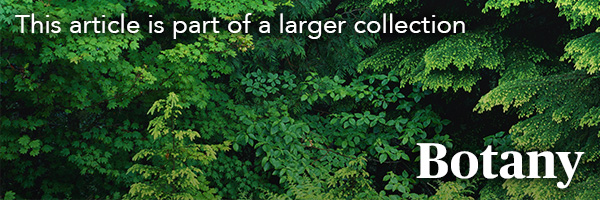
Cedar, in Canada, refers to evergreen conifers (genus Thuja) of the cypress family (Cupressaceae). They are also called arbor vitae [Latin, "tree of life"]. The true cedars belong to the coniferous genus Cedrus (pine family) and are found from the Mediterranean to the Himalayas. Six species of Thuja are recognized: 2 in North America; 4 in eastern Asia. Western red cedar (T. plicata), found along the BC coast and western slopes of the Rocky Mountains, may attain 60 m in height, and 3 m in diameter. Eastern white cedar (T. occidentalis), growing to 25 m, occurs in the Great Lakes-St Lawrence forest region. The Asiatic species, T. orientalis, is often planted as an ornamental. The yellow cedar on the coast of British Columbia is a species of cypress.
Cedars have small, scalelike leaves that cover flat, spray-like branches. Oval cones are 1-2 cm long. Bracts (modified leaves) and scales (ovule-bearing structures) are fused. Pollination occurs in spring; seeds (small, with 2 lateral wings) are shed in the fall. The wood is soft, light, aromatic and decay-resistant. Aboriginal people of the West Coast used cedar for totem poles, canoes and lodges. It is thought that the tea made from the leaves and bark of the Eastern white cedar was the cure for scurvy that ravaged Jacques Cartier's crew in the winter of 1535-36, (see also Uses of Plants Among Indigenous Peoples in Canada). It is for this reason Thuja species received the nickname arbor vitae.
When did the Apple tree arrive in Canada and why do some trees in B.C live over a thousand years? A quick peek into some of the history kept by our land’s oldest living knowledge keepers — trees.
Note: The Secret Life of Canada is hosted and written by Falen Johnson and Leah Simone Bowen and is a CBC original podcast independent of The Canadian Encyclopedia.

 Share on Facebook
Share on Facebook Share on X
Share on X Share by Email
Share by Email Share on Google Classroom
Share on Google Classroom

